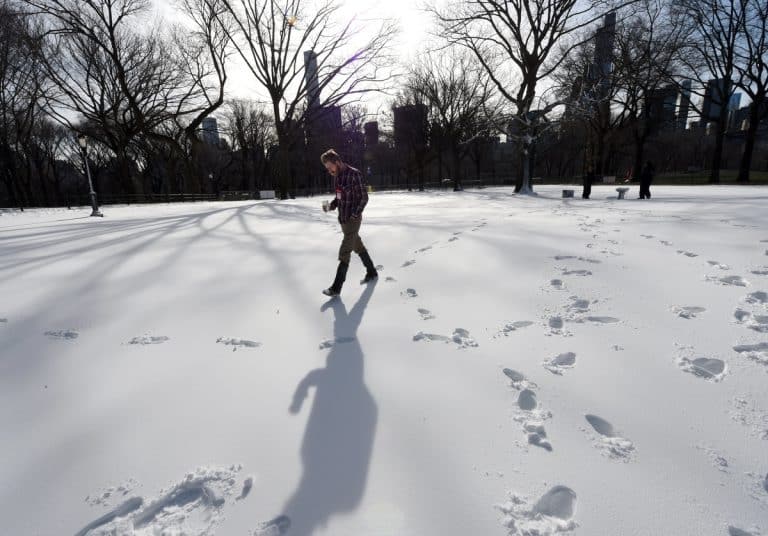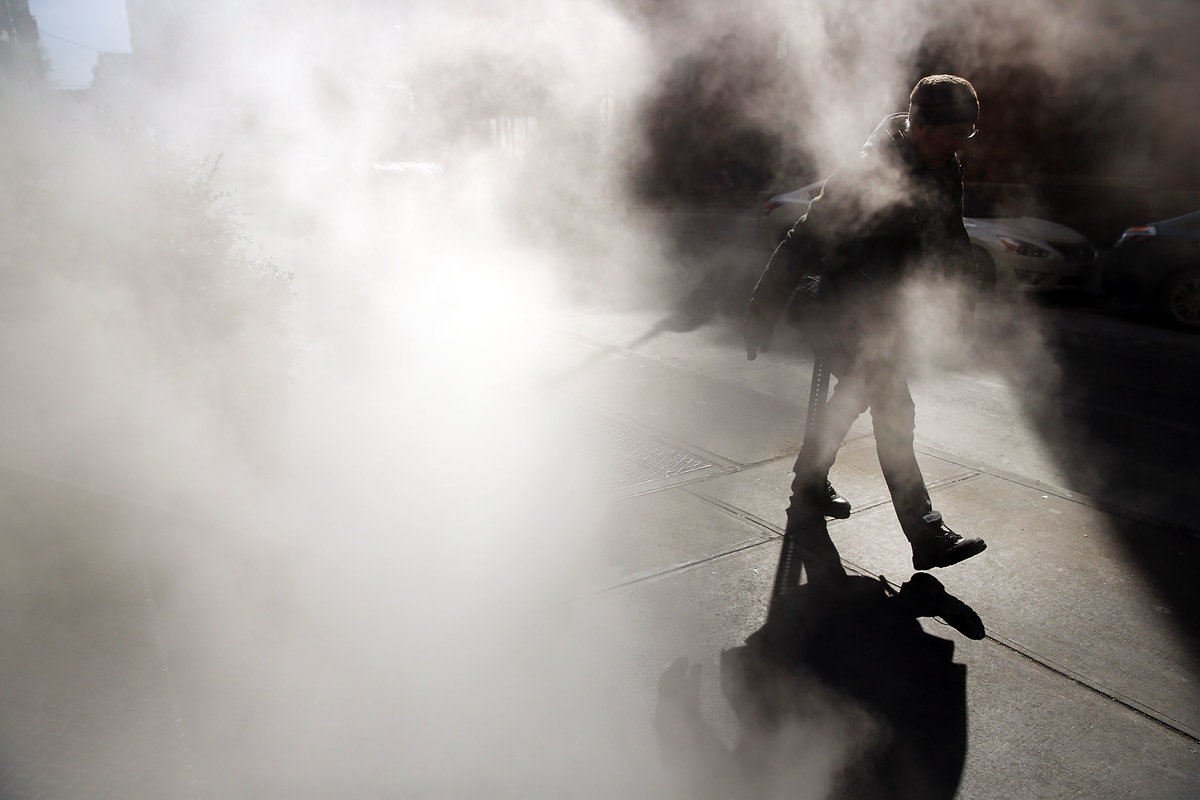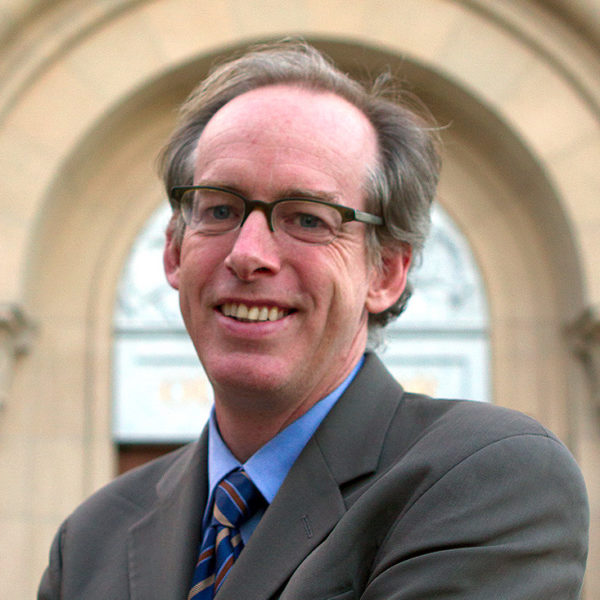
Image by Timothy A. Clary/Getty Images, © All Rights Reserved.
The Halting Inelegance of Advent
After the first day of school and the 15th anniversary of the 9/11 attacks; after a fall season of youth soccer matches involving Sunday drives to three states; after the World Series went seven games and extra innings; after Columbus Day, Halloween, Veterans Day, and parent-teacher conferences; after the National Book Awards and the Nobel Prizes; after the presidential debates, Election Day, Election Night, and the morning after; after 25,000 marathoners trotted through the neighborhood, shaking the last leaves from the trees; after Thanksgiving and Black Friday and Small Business Saturday —
After all this, it was the First Sunday in Advent, and I, against the odds, had made it to the Brooklyn Oratory.
I locked my bike to the ring-rack outside the church, took off my helmet, and climbed the steps, beginning again.
Advent, we are told, is a time of waiting, and, as such, is countercultural: in our society of instant gratification (many a homilist has explained) it invites us to enter a different order of being, involving patience, anticipation, expectation.
It’s a lovely idea, but my experience is otherwise. As a parent, a city dweller, and a Catholic of persistent faith and fitful observance, I find that Advent is more like a soft opening, a wayfinding.
The first Sunday of Advent is the beginning of the Christian year. So Advent is marked out as a time to begin again. The run of fall events is behind. Christmas and a new year are ahead. A tall candle, unsullied at the top, is screwed into the candlestick on the altar; a match is struck; the fresh wick swells into flame, and the wax pooling at the tip of the candle, till it dries, is as fresh as the season.

So I begin again. I try to begin. That first Sunday, the readings are in conflict, nay contradictory: St. Paul says we are nearer to salvation than when we first believed; Jesus says no one knows the day or the hour — we could be near, we could be far, that is. Well, guys, which is it? It’s a perplexing way to begin.
The second Sunday, it is 70 degrees, and a soccer tournament has bobbed up onto the schedule; our sons’ teams advance, and the finals go on into the evening. On Long Island, standing on a sideline, six o’clock, I hear church bells ring.
Ten days in, the clothes extracted from the closet and stacked neatly near the door for donation to the needy are still near the door, not so neatly stacked anymore. The Advent calendar is propped up on the piano, but we eat out with friends one night, get caught up in homework the next, and then wind up opening three days’ cardboard Advent windows at once. The Advent wreath is out of storage, but it’s dispiriting to set it up with candles already burned down to different lengths from last year (or was it the year before?) — and we still can’t remember whether the third week’s candle is supposed to be pink or purple. In the carved wood one-piece nativity sculpture, Joseph’s head has snapped off again. He has a necklace of Super Glue at this point; every Christmas season he is fixed, and every Christmas season he is decapitated afresh.
It’s a halting, inelegant beginning. REM’s song “Begin the Begin” comes to mind, the title suggesting that grand beginnings start with humble beginnings incorporated tinder-like within them.
And yet such a beginning suits Advent. Advent is four weeks in which to find your way — in my case, to find my way back — before the emphatic full-on commencement that is Christmas. And it seems to me that this experience of wandering in and finding one’s way is as much akin to the experience set out in the nativity narrative as waiting is. It’s no stretch to imagine the parents-to-be in the Holy Land struggling to get their act together — packing bags, amassing baby clothes and sundries, plotting the route to Bethlehem, and generally taking care of things before their new life begins.
In Brooklyn, a fresh wreath from the greenmarket goes up on the door, fastened there with a gold tassel reclaimed from a Halloween costume. The CD of Bach’s Advent cantatas comes out and stays in the changer, played over and over — whether out of laziness or ritual observance it is hard to say, but the music perfumes the apartment, hinting at Christmas day after day. Christmas lists are made in pencil on loose-leaf paper; links to buy-buttons are sent. A card in a red envelope arrives from an aunt who is always on top of everything, then a card from a friend we never hear from otherwise. An artificial tree is erected in the lobby of our apartment building. It’s time to order the turkey. Christmas is only 15 Shopping Days away.
After all this, it is the third Sunday in Advent. At a quarter to six I leave the holiday party in the lobby and ride down the hill. I lock my bike to the ring-rack outside the Oratory, take off my helmet, and climb the steps, beginning again.
It’s already dark, and cold, too, and the church, lit up inside, is seasonally festive. The opening hymn, sung by the cantor without accompaniment, sounds old and pure enough to have been sung in Advent when Chartres Cathedral was under construction. The vestments and altar cloth, purple the last time I was here, are now pink, and Father Mark — here’s the answer to our question — explains that this is Gaudete Sunday, a pause for joy in the midst of a season of penitential waiting and anticipation.

I am no longer beginning. Whatever this is — the whole vast and vexed undertaking that is Christian belief, I mean — I am in it again.
And what is it I am in? The next Sunday’s gospel will suggest an answer. The reading is the laconic passage from Matthew in which Mary learns she is with child and Joseph, not having slept with her yet, trusts her in the circumstances. It’s a family story, one in which fatherhood isn’t turning out the way the father hoped or expected, and one with plenty of pain and sorrow to come — and yet one in which there are moments of family serenity and solidarity, of love and trust, so true and powerful that twenty centuries later people are still coming together on cold evenings to celebrate them.
After Communion I pause and kneel to pray at the altar to John Henry Newman, a famous Oratorian. Next to a portrait of him, his poem “Lead, Kindly Light” is stenciled on the wall in gold leaf, and a line from it catches my eye:
“. . . I do not ask to see the distant scene — one step enough for me.”
Up the hill, my family is getting ready for dinner. I pray for a few moments, and then I go out of the church and down the steps. There on the seat of my bicycle is a scattering of the first snowfall.
‘Tis the season.
